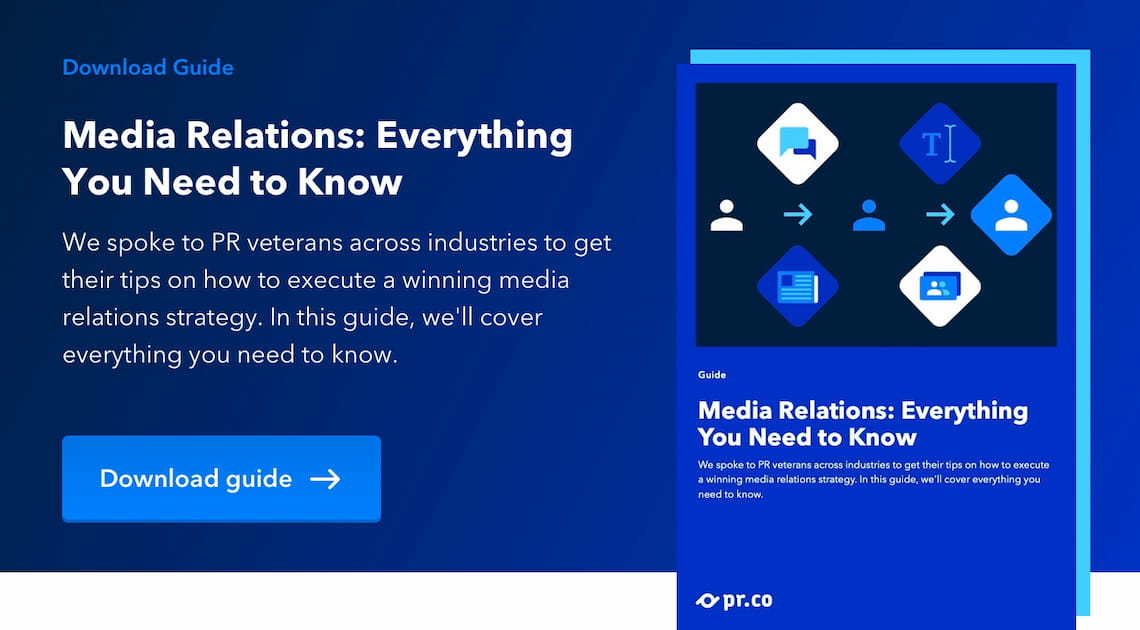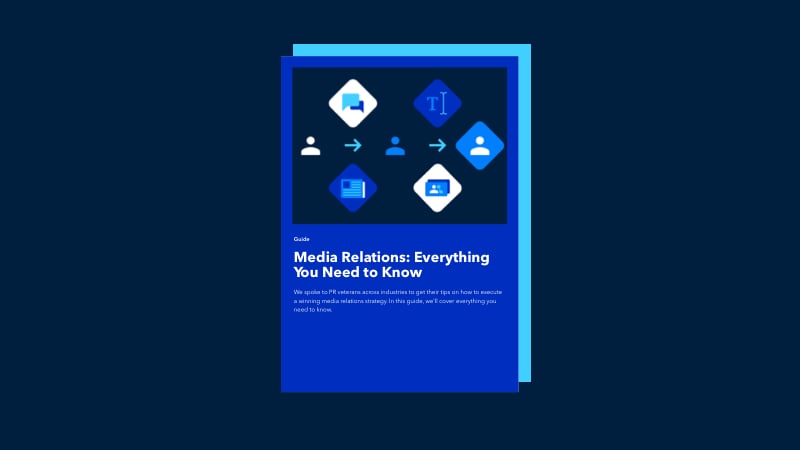Matías Rodsevich is the founder of PR Lab, an Amsterdam and Stockholm-based integrated PR agency which, in a record time of 2 years, became one of the top PR agencies in Western Europe. He sat down with us and shared his thoughts on the sharing economy, how to get introverts to network, and PR's biggest hangup: measuring success.

When Matías Rodsevich started an informal PR event he did not predict it would turn into the thriving PR community it is today. Below he talks to Unfold about lessons learned since its inception.
Describe PR Lab in your own words
PR Lab is a community of PR professionals that really needed to get together but didn't yet have a space to do that. It’s a place where we network but I also like to think of it as part of the sharing economy. We all chip in and contribute to the common knowledge. This is especially important in a changing industry like PR, where things can be uncertain.
I care about innovation: we don't focus as much on the roles of people who speak or come to an event. As long as they have an interesting story or learned experiences they would like to share with others, then they're welcome.
Before we started, there wasn’t really an initiative for people doing PR in startups or scaleups. There was a lot around for corporates and agencies, with big budgets, really flashy stuff. But there were all these people that were left behind that didn't feel like they belonged. I think that's why PR Lab has resonated with a lot of people.
In a recent online webinar, Matias Rodsevich spoke with seasoned crisis communications experts on how to prepare for crises and the impact of COVID-19. Here are the biggest take-aways from the 60-minute conversation.
.jpg?width=1140&name=325562-IMG_5959-74c085-original-1564491106%20(1).jpg)
Do you have a mix of big and small names in PR speaking at events or do you stick to the crowd-pleasers?
I end up leaving those sessions feeling like I didn't learn anything, it becomes a source of inspiration instead of anything tangible. It’s often filled with generic advice like ‘listen to your users’ and ‘talk to your people’. All these things are nice, but there are many more valuable things that they don't teach you at university that you have to learn through experience.
I feel that by having these educational events, you can really fast track your career. When people share their ‘behind the scenes’ strategies and say ‘this is how you do stuff’ and show templates, it saves you so much time.
I’ve personally shared successful pitches that I’ve sent to journalists that worked really well. I’ll share the template and say ‘feel free to use my structure, it worked for me, it might work for you as well’. And people will say it’s the first time they’ve been to an event where people openly share so much.
Within our industry is this concept that sharing will put you in a dangerous position. For me, it's the other way around, the more I share, the more I know. The more I connect, the more opportunities I get.
I just feel like a lot of people still think you cannot really share too much with your competitors. But I think if you're good at what you do, it doesn't matter if somebody copies your pitch, because you're gonna come up with better ones.
Is there a cultural element at play? When Jon Woodroof from Twotone spoke to us on the topic of networking he said something similar: Silicon Valley was born from a culture of sharing but it is still a newer concept in tech hubs abroad.
I don't know if it's that much about the country, I think it's more about the field of work. For example, the reason we organized a collaboration meetup with the Growth Hacker talks is that they have the same philosophy. But they also have a bigger community. The growth hacking environment, in general, is all about sharing. They have so many resources, and they really do share so much. There are Facebook groups, Slack channels, shared spreadsheets, they are constantly sharing hacks with each other.
I saw those communities becoming really active online and I got inspired by them. So I tried to apply this to the PR world. But I think the pace is slower because we are still trying to catch up with technological advancement and bring PR up to the next level.
I’ve realized the main reason why PR people don't share much with each other, is that PR is really hard to measure. Therefore, a lot of PR professionals are really self-conscious about their skills. They think: am I doing a good job? When I invite people to speak at events they say ‘yes, I would love to, but I don't know if I will be the right speaker, I don't know if I have an interesting enough story to share.’
People feel that their story’s not relevant enough, or that they're not doing a good job. And that's what I try to do with these events, to show people that it's not only about results or how much you’ve sold, although that, of course, plays a part. But it can also be about having an interesting approach to stuff, like getting a story published in an original way. Or because you conduct great media training or are using an interesting tool.
Why did you decide to start PR Lab?
When I started in PR I was thrown in the deep end of a really fast-paced world, it was really competitive. You had big players in the market with very good features. These were big challenges for me and I was trying to mingle with people at events but there was nothing really for me. The events were too expensive and only featured people from big companies as speakers.
I thought, these events are not speaking to me, they’re targeting different people. The startup and scaleup industry and other niche industries are driving so much value and money into the economy of not only the Netherlands but the world.
I thought, there's something missing here, so I'm just going to organize a meetup, with two speakers, I'm going to speak myself and see how it goes. I think forty people showed up. And then after the meetup, three or four people said I really want to help you organize it and it just grew from there.
.jpg?width=736&name=325561-IMG_3894-cd80a6-original-1564491102%20(1).jpg)
Do you sense a yearning for community?
But that's just the thing, you don't need to be an extrovert to do PR. A big chunk of PR is writing and desk work. There's a misconception around it but most of the media that I deal with, editors and journalists, is via email or chat.
Some people come but they don't interact. And I always try to foster that interaction by saying, talk to the stranger next to you. And I try to get the speakers to have some sort of interactive activity.
I feel that people struggle to talk to strangers, they get shy. And so I feel especially grateful for the fact that attendees sometimes go out of their comfort zone. They could be at home watching Netflix, but they came to an event by themselves, so they deserve a chance to connect with people.
I am always introducing people I see it as my role at events. I will say ‘hey, you should meet this person, you guys should talk because he's looking for a job and you're hiring, or you are a great agency, and they offer really cool stuff’. You need to make it easier for them by having at least one activity for them to connect. And if they don't want to, it's fine, but at least you had it in place.
Here's what Mathias had to say on building a network, instead of a collecting a list of media contacts.
How important do you think empathy is in PR?
Empathy is everything. A PR freelancer once told me ‘my role is actually to put myself in the shoes of the client and think what they want to get out of the story and put myself in the shoes of the journalists and what they want to get from the story and find a middle ground’. That’s empathy. Listening, self-compassion, all these soft skills are really important. They’re also things you need to be good at writing.
.jpg?width=736&name=325563-IMG_6016-0d98ae-original-1564491107%20(1).jpg)
How do you measure PR?
That is something I was talking to a growth hacker friend of mine about this morning. I love growth hackers because I feel like they are the opposite to us (PR people). They have some of the skills we wish we had. We have all the skills that they wish they could have.
Surprisingly, my friend said marketers need to understand that you cannot measure everything. I can’t, for example, measure how many people like me and what people think about me. It's impossible because that changes all the time.
There are of course ways of measuring PR. There are indicators, there are ways of getting close to its impact. But most of these tools that we see provide estimations. You learn how many people read your article rather than how many people actually like your company.
We need to understand that if we're working with reputation, you cannot apply the same metrics we apply to digital marketing. Because it's not the same, we're not working with the same things. We're not selling stuff directly, we use an indirect way of selling, that deals with your reputation and building your presence. The obsession with measuring everything in real-time needs to go.
There isn't a one-size-fits-all approach to measuring PR. Here's our honest take on how to track the success of your campaigns.
Do you think most of the pressure to measure everything comes from the top? So people can justify their work and get the budget they need to do the things that they want to do.
Two questions I always ask my clients are: do you actually need PR? and do you understand what PR is?
Because if you understand what it is and how it works, the pressure would subside. If you just want to sell, it’s better to do growth marketing or sales campaigns.
You first need to understand what kind of value you can get from PR before you begin to measure it. I think it’s part of our (PR professionals’) jobs to get companies to understand what PR is, how it works, and what its timeline is. It’s a long-term strategy.
The thing is, if people are scared of pushing back, and they take on a task with this added pressure, and might think ‘actually I cannot deliver’. But maybe they are delivering but because they’re measuring against short-term metrics from growth marketing that don't apply to PR it appears as if they are not.
So if you're (the client) in an urgent position, they should just do something else. If you want to do PR, this is how it works. And sometimes it's better to say no to companies that don't understand PR. No to people that don't understand what your job is about. And don't waste your time, just go work somewhere else or start your own thing.
Can you apply metrics to relationships?
We need to understand this obsession with measuring everything does not always work with relationships. Once I was pitching a story to a contributor at one publication, and that contributor happened to work at a big tech company, and thanks to putting the story in front of this person we got this big tech company as a client. That's one thing that came out of PR. But how can I measure that with the traditional metrics? I don't know. But it opens doors, and it helps you sell sponsorships with people.
By talking with influencers, interviewing them for content, getting that content out in publications, you also get new clients, it's a way to make sure of that. It's one-on-one, it’s interactions. It's human, it's relationships. It's hard. We don't measure relationships outside of work as that would be hard work. I don't have metrics from my friends and family and love life.
A big part of our job is to build relationships. So we need to understand that those things don't need to be measured in the same way as we measure sales because we don't put numeric metrics into relationships, because it would be counterproductive.
So you wouldn't measure success at PR lab in with quantifiable metrics?
We send feedback forms after each event, we do a mix of qualitative and quantitative, feedback. Because, of course, we always want to understand how we did overall and if it was good or not.
And in my agency when my clients see how we prove value in our efforts, how many stories we are pushing, then they can see the results of cooperation. I also try to put some numeric attributes to our work, like how much referral traffic we got, and out of that how many people became clients.
For me, the most important metric is the NPS. So yes, we measure, but it shouldn’t be everything. In the end, I think a big part of it is moving from a reactive to a proactive approach.
.jpg?width=736&name=325558-TNW%202019%20-%20Amsterdam%2c%20The%20Netherlands%20-%2009%20May%202019%20-%20Image%20copyright%20Bas%20Losekoot%20-%20mail@baslosekoot.com%20%20-%20137%20-3310-84cd2c-original-1564490941%20(1).jpg)
Tell me about starting your agency.
I didn't really enjoy working as a freelancer because I felt a bit lonely, even though I enjoyed the freedom. I was lucky enough to be contacted about some companies saying, ‘Hey, we have projects, we would like you to help us. So I thought okay, I'm just gonna hire people. It was a tough decision. But I love it.
Our agency goal is to help purpose-driven companies be successful. That's our vision. But a lot of our companies are not purpose-driven and we're helping them find that purpose.
I really like my team at PR Lab. You have fresh perspectives on work. I can say ‘hey I'm not sure about this. Can you check it for me?’ That's so priceless.
When you start a business, people assume that you're going to try and grow as much as possible, we do work hard and want to keep growing. But something that’s important to question yourself is: do we become a growth at all costs machine? Or do we just focus on building a healthy business?
Do I want to follow the standard PR agency growth path of getting to the marketplace in any way possible, but not delivering such great work and burning your people. It’s the only way to make good money as an agency owner because the retainers are not normally very high. The higher they are, the more people you need to get on board to deliver better work.
Finding the balance is hard. But I’ve realized that my goal is not to be rich but to enjoy the projects that I'm working on and take care of my people. So sometimes I’m saying no to things, and no to that unconscious way of growing. What I enjoy most is doing something that I love. I can make the decisions, but also have a team of people that are happy to enjoy the ride.
I'm always offering benefits like coaching sessions, because I also struggled when I was really young and I have a lot of young people working with me. I try to help them to grow not only in traditional skills but also in soft skills. So they can understand where they want to go and how to overcome obstacles. To provide a safe space for them to open up and having a nice time at work. Because ultimately, they give most of their life to you. So the least we can do is make it nice for them.

Matías is the founder and CEO of PRLab Amsterdam, an integrated marketing Communications agency specialized in Tech Scaleups. He's also the founder of PRLab Amsterdam, a community of +800 members that get together every 2 months to discuss innovation on the field. Matías has over 7 years of work experience in the Tech-PR field, he helps startups and scaleups raise awareness, secure funding and build a solid reputation in their industries by executing results-driven media relations and thought leadership.. Connect on LinkedIn or send an email



/Matias-1.png)

/Matias-1.png?width=100&height=100&name=Matias-1.png)
